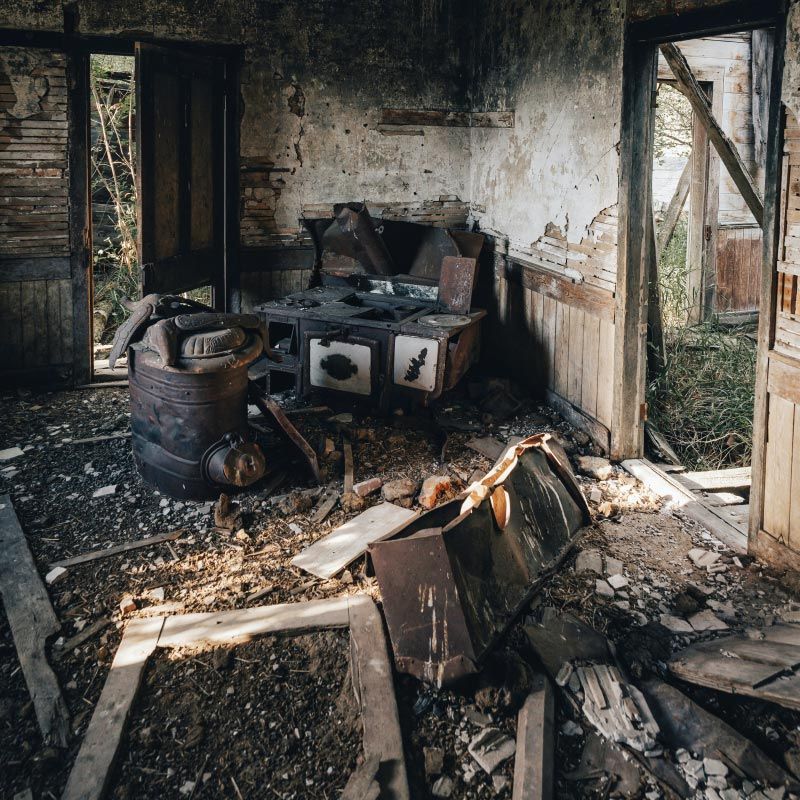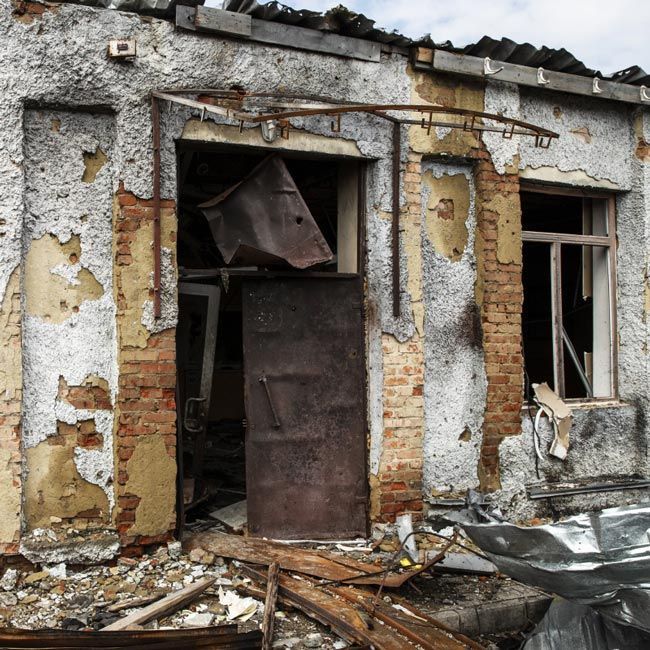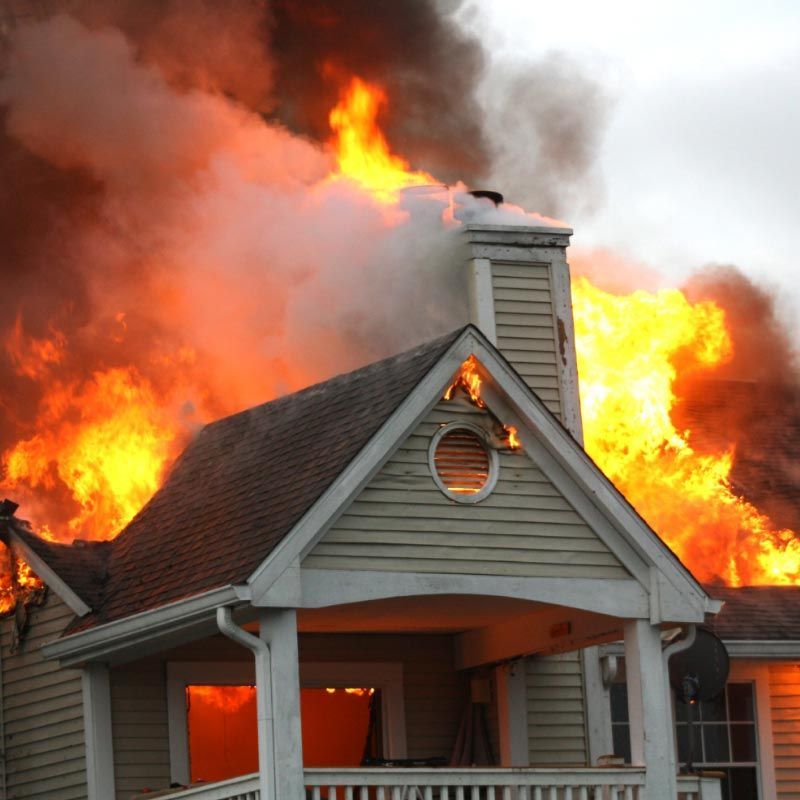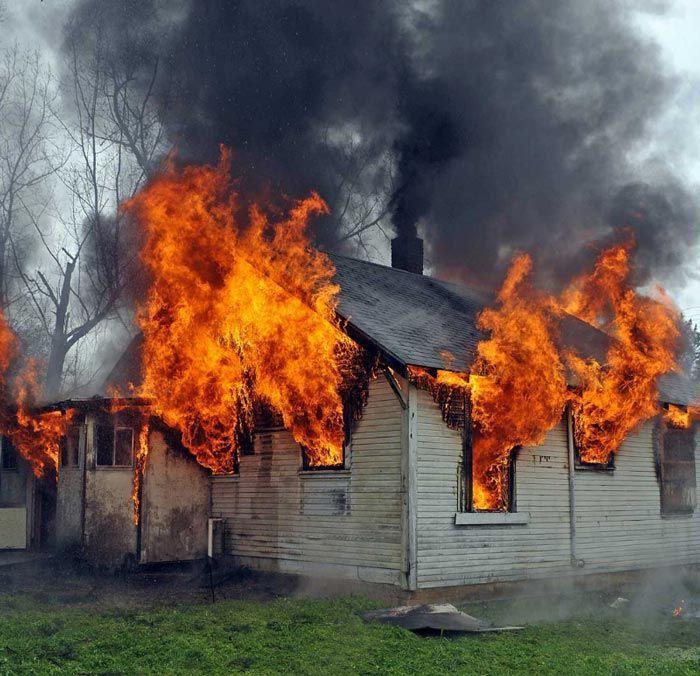Who Buys Fire Damaged Homes? Potential Buyers Explained
Free Offer Form
We will get back to you as soon as possible.
Please try again later.
Selling a fire damaged house is possible, though may be difficult with a real estate agent. Selling as-is to a National cash buyer is one of the best options. Fill out the form below to get started and find out what your property is worth.
A fire can cause extensive damage to a home, but there are still buyers interested in these properties.
You can approach buyers who pay cash, or real estate investors and house-flipping companies.
These licensed professionals are interested in these properties because they can buy them at a fair market value and make money by renovating or selling them.
Read this article to learn more about who buys fire-damaged houses.
Who Buys Fire-Damaged Homes?
Real estate investors, cash buyers, and house flippers all typically purchase fire-damaged houses.
They can locate potential fire-damaged properties from homeowners who may wish to sell their properties.
Selling your fire-damaged house quickly may be difficult if you're unfamiliar with the regular property retail market.
Real Estate Investors
Real estate investors are skilled at buying and fixing fire-damaged houses. They can evaluate the extent of the damage and effectively manage major repairs.
Like other buyers, they are attracted to these properties because a fire-damaged home has a lower market value. They can profit off of these homes, either by selling them after restoration or renting them out.
Compared to a traditional mortgage lender who'll avoid accepting fire-damaged properties, a real estate investor specializes in these scenarios and has buyers ready.
A real estate investor can allow you to sell your house fast and acquire cash immediately, even if you sell your fire-damaged house in its current state.
Cash Buyers
Cash buyers can be individual homeowners looking for a new home. Due to the transaction's ease, they may buy a fire-damaged home for personal use or as an investment.
However, they can also be real estate investors or house-flipping companies that can purchase a home outright, in any condition — sparing sellers from extensive disclosures and liabilities.
Regardless of issues like code violations, permits, mortgage arrears, or liens, cash buyers provide fair all-cash offers, free from complications.
However, it's essential to note that cash home buyers, real estate investors, and house-flipping companies all have distinct approaches.
House Flipping Companies
House-flipping companies also buy fire-damaged properties and they efficiently manage the entire fire-damage restoration process — from planning to sale.
Unlike individual real estate investors, house-flipping companies often focus exclusively on the buy-renovate-sell model.
They usually have a stricter process, so it may take time before you can secure your money from selling your property. Nonetheless, large flipping companies assure a more reliable process.
Factors These Buyers Consider
Buyers of fire-damaged properties consider several factors when evaluating a property.
- The Extent of Damage: The severity of fire damage and the property's overall condition.
- Location: Property location and its resale or rental potential.
- Repair Costs: Buyers factor in repair expenses when making a fair cash offer.
- Market Conditions: The current real estate market.
- Home Insurance Coverage: The insurance company can affect the financial burden of repairs.
- Mortgage Status: Existing mortgage loans affect the buyers' approach.
Immediate Financial Needs: Buyers ensure they meet the necessary funds for the property, repairs, and ongoing expenses.
Can I Sell a Fire Damaged House National?
Yes. You can sell a fire-damaged house. However, it may be harder to sell in the local National real estate market in as-is condition. You would have to make repairs and possibly rebuild most parts of your house before a buyer takes interest in the property. Your best option when selling a fire-damaged house is a cash buyer. They buy burned houses as-is so you don't need to spend money on repairs. They'll handle all the cleanups and renovations for you, however, expect that their offer may be below the cash value of your property.
How to Sell a Fire-Damaged Home?
Selling a house with fire damage is tough but possible, and a cash home buyer is the easiest option for homeowners.
Today, the process of selling fire-damaged homes is simpler. Many cash home buyers have an easy process. Just fill out their online forms and get a free, no-obligation quote.
Here's how to sell fire-damaged house fast:
Evaluating the Extent of Damage
You need to thoroughly inspect different parts of the property, including areas with water, soot, heat, and smoke damage. You'll also need to protect the property from suffering further damage.
Consider getting help from a damage assessor or real estate agent for precise damage assessment. They are experts at calculating potential restoration costs, understanding the repairs needed, and setting realistic expectations.
The professional real estate agent may ask about your home's size (square footage) to provide an accurate cost estimate for the new owner.
When evaluating the extent of house fire damage, remember to carefully examine all impacted components — including pipes, machinery, and structural components.
This is necessary for the home's occupant safety and affects the replacement cost and the value of the burned house on the market.
Understanding Market Conditions
Selling a fire-damaged house can be more difficult than selling one in good condition.
Typically, fire-damaged properties have a lower market value because buyers expect to invest in repairs and restoration.
Cash home buyers will consider these repairs when making offers, even if the fire caused the property to look like a total loss.
Therefore, the longer you leave your fire-damaged property neglected, the more difficult it will be to sell.
Stay informed about your local real estate market to adjust your selling strategy.
Disclosing the Fire to Potential Buyers
Disclose the damage's extent to possible buyers to avoid future legal issues.
When selling a house with fire damage, it's not just about finding the right buyer but also being honest about the property's condition.
These should include inspection reports detailing the fire damage, repair records, and any insurance policy covers related to water and smoke damage.
Being truthful about how much damage there is matters a lot. It keeps buyers informed and makes the seller more trustworthy.
NOTE: Some "As-Is Sales" buyers may accept properties in any condition without requiring sellers to disclose information. Before closing the deal, consider obtaining the relevant insurance coverage.
Options for Selling
Selling directly to a cash buyer may be the best option, as you avoid commissions and closing costs. However, it's best to explore your options first.
The two most-used options for selling a fire-damaged house are auction or accepting a cash offer from a buyer.
- Selling to a Cash Buyer: You can sell the home to real estate investors who buy fire-damaged houses that have sustained fire damage or list the home with a real estate agent or on the standard housing market.
- Auctioning the Property: You can also auction your fire-damaged house, which may attract investors and opportunity seekers.
Auctions can guarantee a sale date and drive the price, but selling to a cash buyer can be profitable and can sell your house fast.
Benefits of Selling to Companies or Investors
Homeowners facing the aftermath of a fire encounter several decisions, one of which is whether to sell the property as-is or invest in costly restoration.
Partnering with fire damage restoration companies or real estate investors can be extremely valuable.
Cash buyers assure a speedy selling method, no restoration costs or hidden fees, and reasonable cash offers.
Speedy Selling Process
Selling to companies or real estate investors can expedite the process,which can be advantageous for homeowners.
Buying a fire-damaged property can be done in 3 easy steps:
- Call or fill out a simple online form. After completing a few details, you'll be offered a fair price and will be contacted once the investor is ready.
- You will receive a free and no-obligation offer. If you sell the home as-is, you save thousands on realtor fees, closing costs, and necessary repairs.
- Choose the closing date. Real estate investors and companies will let you pick your most convenient time.
NOTE: If you are already dealing with an insurance company or insurance adjuster, you can still sell your house fast and work with them.
No Restoration Costs Incurred
You won't have to worry about expensive fire damage restoration costs because they'll take care of the repairs and rebuilding.
When you sell to these companies or real estate investors, you don't have to spend money fixing up the property before selling it.
You'll know exactly how much you'll get for your property because the sale price is based on its current condition.
Get Cash Offers
Investors and cash buyers can provide you with a cash offer — avoiding the uncertainties of traditional financing.
These buyers have the funds to purchase your house fast.
Selling a property that needs repairs is simpler with a cash offer, as any buyers will purchase it and handle repairs themselves.
Companies and investors often have readily available funds, allowing them to close deals promptly without the delays of a traditional mortgage lender.
The Process of Selling Fire Damaged Property to a Cash Buyer
The process of getting a cash offer for a burned house is pretty much the same as any property type. However, it is best if you can contact your home insurance company first before getting an offer for your house after a fire. Your National home insurance company can help assess the extent of the fire damage as well as the repair costs. This can help you decide whether selling a house as-is to a cash buyer is really the right path to take. Once you have decided that you really want to get a cash offer, here are the next steps you should take.
Important note: This doesn't apply to all cash buying companies.
1. Request a Cash Offer
You can easily find cash buyers in your National area by searching online. Once you found a reputable cash buyer, head over to their website to fill out a form or give them a call to ask for a cash offer. Most cash buyers and real estate investors give no-obligation cash offers so you can still ask other cash buying companies how much they can buy your fire-damaged property. If you are unsure about the background of a cash buyer, you can always ask them for proof of their source of funds.
2. Welcome the Cash Buyer into Your Home
The cash buyer or real estate investor may want to check your fire-damaged property for the repairs and improvements it needs, especially its roofing, walls, foundation, etc. You won't have to pay for these repairs when selling a National house to them, but experienced home buyers or real estate investors consider repair costs to make an accurate cash offer.
3. Review the Contract and Sign
Once you accept the cash buyer's offer on your fire-damaged home, they would furnish a sales contract and send it to you electronically. You will be given time to go over the terms and ask questions. After everything is settled, sign the contract to make the deal with the National cash home buyer official.
4. Closing
During closing, expect less paperwork since there are no lenders involved. After you have signed the minimal necessary paperwork and the National deed is transferred to the cash buyer's name, you'll get your cash in your bank account. If you aren't confident attending the closing by yourself, bring a real estate attorney with you.
5. Set Your Preferred Day to Move-Out
If the property has minor fire damage and you are still living in it, communicate to the cash home buyer when you want to move out. This is also a good time to ask for a sale-leaseback agreement if you don't have a place to crash on while you are still looking for a new National home.
Downsides of Selling Fire-Damaged Homes
Two significant disadvantages are selling the fire-damaged property below its actual cash value and the potential for exploitation.
While real estate investors often buy fire-damaged houses with a cash offer, they can still negotiate for a lower price.
Therefore, ensure you receive a reasonable offer during these property transactions.
Selling Price Below Market Value
One of the trade-offs of selling a fire-damaged home is that you might receive a lower price than the actual cash value in the current market.
Fire-damaged properties are often less desirable — leading to limited demand and fewer competitive offers.
Buyers may be worried about the extent of the damage, the cost of repairs, or the possibility of future problems. These expected costs are factored into their lower offers.
As a seller, you may need to lower your price expectations when selling a house with fire damages.
Potential for Exploitation
After surviving residential fires, the homeowner may be vulnerable, stressed, and emotional, making them susceptible to exploitation by unscrupulous buyers.
While most buyers are reputable, there is a risk of encountering unscrupulous individuals or companies.
Exploitative tactics include low balling offers, pressuring quick sales, and taking advantage of the seller's lack of knowledge about repairs and property value.
This can result in significant financial losses for the seller, as the property may be sold below its actual value. Always look into your buyers thoroughly, whether they're a cash buyer or a real estate investor.
Buying Fire Damaged Homes: An Opportunity for Investors?
Real estate investors can fix fire-damaged properties and resell them with effort and smart investments.
Fire-damaged properties can be attractive to buyers but come with risks.
Factors Attracting Investors
Real estate investors are ready to fix and upgrade these homes because the benefits are worth the challenges.
- Discounts: Homes damaged by house fires often sell for much less than their market price due to needed repairs, offering a profit potential for investors.
- Quick Turnarounds: Limited supply and investor demand make it possible to resell and repair fire damage quickly.
- Tax Benefits: When you renovate or buy fire-damaged houses, investors may qualify for tax advantages, like depreciation deductions.
- Profitability: Renovations can increase the property's value, leading to higher resale prices.
- Low Competition: Homes damaged by a house fire may have fewer competing buyers, giving investors negotiation advantages.
Risks and Rewards
These investors can reap the benefits mentioned in the previous section, such as discounts, quick turnarounds, tax advantages, profitability, and limited competitors.
However, the following are some of the inherent risks to the investors:
- Hidden Repair Costs: Repairing fire damage may cost more than the investor's initial estimate.
- Resale Challenges: Poor repairs can make reselling a burned property difficult, potentially resulting in financial losses.
- Reputational Risk: Inadequate repairs can harm an investor's reputation, affecting future property transactions.
- Market Fluctuations: Real estate markets can be unpredictable, affecting the time it takes to sell and return on investment.
Regulatory Challenges: Dealing with local regulations, permits, and inspections can cause delays and added expenses.
Legal Considerations When Selling Fire-Damaged Homes
Landlords have specific legal obligations after a fire occurs in one of their rental properties.
But, just like there are obligations of landlords after fire, there are also legal considerations both the buyer and seller must comply with.
Selling a burned home can be complicated, especially if you haven't paid off your mortgage yet. Selling to a cash buyer or investor is often the best option.
Disclosures Required by Law
When selling or buying a fire-damaged home, both sellers and buyers must adhere to specific legal disclosure requirements to avoid any issues in the future.
Here's a breakdown of what must be disclosed during the procurement:
For Sellers:
- Be transparent about the extent of fire damage.
- Gather essential documents: inspection reports, repair details, maintenance records, and safety measures to prevent future incidents.
- Provide proof of insurance company coverage for fire-related damage.
For Buyers:
- Include an inspection contingency clause for fire damage assessment.
- Outline the cancellation terms, as well as insurance and liability concerns.
- Clearly state (or put down in writing) the offered purchase price for the fire-ravaged property.
- Make it clear if the sale is "as-is," meaning the buyer is not requesting any further repairs or concessions from the seller.
NOTE: Sellers must disclose fire damage to buyers, regardless of whether it is required by law. Non-compliance can lead to legal trouble.
Regulatory Issues to Keep In Mind
Investors should disclose any compliance or non-compliance with local building and safety codes after the fire and subsequent renovations.
Ensure compliance with these regulatory guides:
- Disclosure: Sellers must disclose fire damage, repairs, and hazards as required by local laws.
- Building Codes: Ensure compliance with current building codes before finalizing a real estate transaction.
- Insurance Company: Buyers and sellers should consider insurance implications and disclose relevant claims.
- Environment: Be aware of environmental regulations related to hazardous materials.
- Permits and Approvals: Obtain necessary permits and approvals for property work.
- Property Taxes: Keep property taxes up-to-date and inform buyers of any outstanding obligations.
NOTE: Sales or burned property may have location-specific regulations, but a real estate investor can navigate them. When they make an offer, it's usually "as-is" with no future obligations.
Frequently Asked Questions
Read this section to learn more about selling and buying fire-damaged property:
What Is the Process of Selling a Fire-Damaged Home?
Selling to cash home buyers is often the fastest process for selling a burned house. They specialize in this kind of sale.
Nonetheless, here are 10 steps in selling fire-damaged properties:
- Assess the fire and smoke damage. Salvage any personal belongings if possible.
- Contact an insurance agent for an insurance claim.
- Estimate all costs involved.
- Ensure legal compliance.
- Choose a method to sell your fire-damaged house.
- Prepare documentation.
- Set an asking price.
- Market the property.
- Negotiate offers.
- Close the sale.
Who Typically Buys Fire-Damaged Homes?
Real estate investors, individual or private cash buyers, and house-flipping companies are all interested in buying fire-damaged property with a cash offer — at a much faster rate and without hefty fees.
In most cases, cash buyers (which can also be real estate investors or house-flipping companies) provide a straightforward solution for selling a burned home.
They also typically purchase homes in “as-is” condition, including those damaged by fire.
How Much Less Can I Sell My Fire-Damaged Home For?
The impact of fire on property values depends on the extent of the damage.
In general, a house with fire damage will typically sell for a lower price than its pre-fire condition.
According to the National Fire Protection Association (NFPA), "more than 45,000 home structure fires ignite every year due to an electrical failure or malfunction, causing more than $1.4 billion in property damage."
Factors like location, extent of damage of the home fire, and market conditions influence the value.
In cases where the fire destroyed the entire home, you might only sell the land's value. Conversely, if only a small portion of the home was damaged, like in a kitchen fire, you can sell closer to the property's value.
Can I Sell My House as Is After a Fire?
Selling your fire-ravaged home as-is is possible but may result in a lower selling price.
If you'd rather avoid the stress of repairs and temporary housing, consider selling to an investor or company that handles burned homes and can take care of the repairs.
Some buyers like ourselves can allow you to sell your house fast and acquire cash immediately, even if you sell a fire-damaged house as-is.
What Are the Legal Implications of Selling a Fire-Damaged Home?
When selling a home damaged by fires, remember the legal requirements of property disclosure, potential liability, and compliance with local regulations.
These should be complied with to avoid future legal issues.
To sell a fire-damaged property safely and legally, consult a real estate agent who is familiar with the legal requirements and can protect you from any potential liability.
Conclusion
Once the fire is out, your home isn't just damaged by fire and smoke but also by water from firefighting efforts made by both residences and the local fire department.
However, fixing a burned home—selling as-is, doing the repairs yourself, or getting help from investors or specialists—depends on your situation, timing, and resources.
While it may present challenges, it's also an opportunity to move forward and find a cash buyer who is willing to buy fire-damaged property.
National Resources
- Selling a Fire Damaged House National
- Selling Inherited Property National
- Selling a House in Probate National
- How to Sell a House by Owner National
- How to Sell Rental Property National
- Stop Foreclosure National
- Selling a House during Divorce National
- How to Sell a Hoarder House National
- Can You Sell a Condemned House National?
- Can You Sell a House in Foreclosure National?
- How to Sell Rental Property with Tenants National
- Taxes on Selling a House National
Free Offer Form
We will get back to you as soon as possible.
Please try again later.
Author: Chris Charles
We buy fire damaged houses because we like taking on the challenge and making a win win for sellers looking to sell. We work with our partners nationwide and are experienced in dealing with the city if its already been condemned. Request a cash offer to have a chat with us today.
Sell Fire Damaged House for Cash Quick
Sell Your House Fast, To A Legitimate House Buying Company You Can Count On. ✔️ Free, Easy & ✔️ No Pressure Process. Find Out How We Buy Houses!
Sell Fire Damage House in California
Sell Fire Damaged House in Ohio
Sell Fire Damaged House In North Carolina
Sell Fire Damaged House In Michigan
Sell Fire Damaged House In Massachusetts
Sell Fire Damaged House In Colorado
Sell Fire Damaged House In Minnesota
Sell Fire Damaged House In South Carolina
Sell Fire Damaged House In Alabama
Sell Fire Damaged House In Louisiana
Sell Fire Damaged House In New Hampshire
Sell Fire Damaged House In Maine
Sell Fire Damage House in Texas
Sell Fire Damaged House in Florida
Sell Fire Damaged House In New Jersey
Sell Fire Damaged House In Virginia
Sell Fire Damaged House In Indiana
Sell Fire Damaged House In Kentucky
Sell Fire Damaged House In Oregon
Sell Fire Damaged House In Oklahoma
Sell Fire Damaged House In Connecticut
Sell Fire Damaged House In Utah
Sell Fire Damaged House In Rhode Island
Sell Fire Damaged House In Delaware
Sell Fire Damaged House in Pennsylvania
Sell Fire Damaged House in New York
Sell Fire Damaged House In Washington
Sell Fire Damaged House In Arizona
Sell Fire Damaged House In Missouri
Sell Fire Damaged House In Nevada
Sell Fire Damaged House In Iowa
Sell Fire Damaged House In Arkansas
Sell Fire Damaged House In Mississippi
Sell Fire Damaged House In Kansas
Sell Fire Damaged House In North Dakota
Sell Fire Damaged House In Alaska
Sell Fire Damaged House in Georgia
Sell Fire Damaged House in Illinois
Sell Fire Damaged House In Tennessee
Sell Fire Damaged House In Maryland
Sell Fire Damaged House In Wisconsin
Sell Fire Damaged House In New Mexico
Sell Fire Damaged House In Idaho
Sell Fire Damaged House In Nebraska
Sell Fire Damaged House In West Virginia
Sell Fire Damaged House In Hawaii
Sell Fire Damaged House In Vermont






